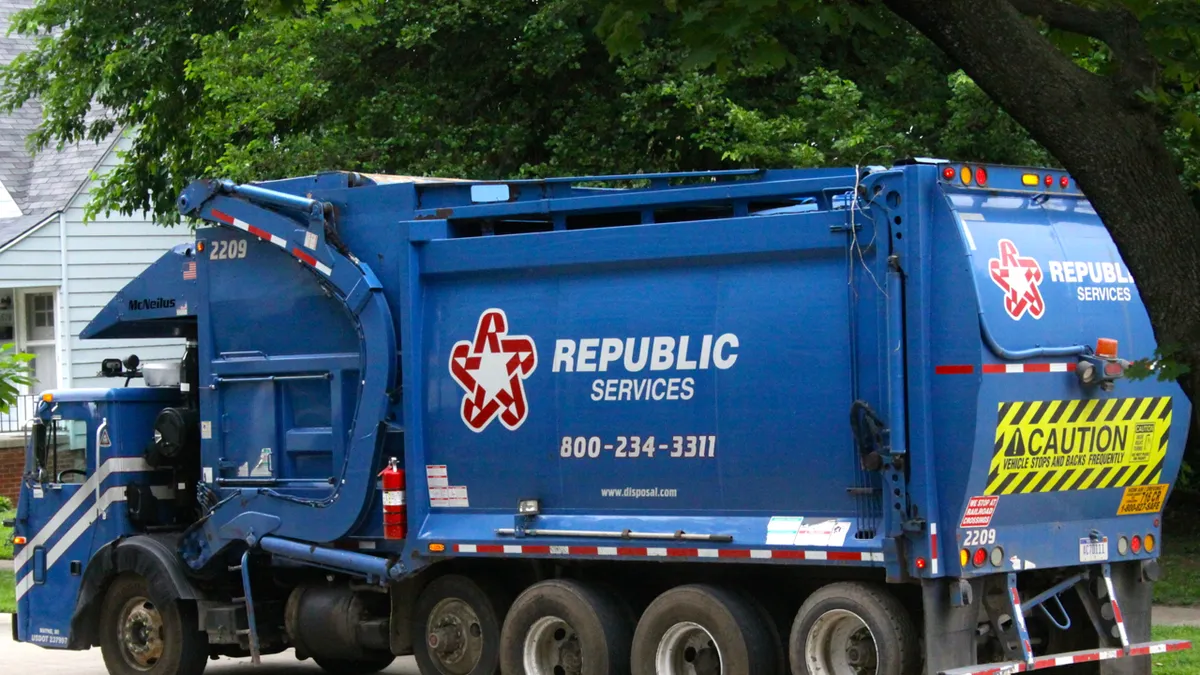Dive Brief:
- Republic Services reported approximately $2.6 billion in third quarter revenue, up 6.3% over the previous year, with net income of $223.2 million. The company has spent an estimated $385 million on acquisitions to date, including $165 million on ReCommunity and another $129 million on tuck-ins during the quarter. Republic also sold $81 million worth of lower margin business.
- Recycling commodity sales revenues, excluding glass and organics, were up 26% compared to last year. Like everyone in the industry, Republic also experienced the early fall drop in fiber prices, but says it has since surpassed the 10-year average. "We believe the recent volatility is again temporary and the pricing we saw in early October is not indicative of a new normal," said CEO Don Slager during the earnings call. According to Slager, the company has had no problem moving material to markets in the U.S., China, Indonesia, Thailand, South Korea or India.
- Slager recognized that tightening commodity specifications had increased costs, though didn't elaborate any further. When asked if the company was prepared to meet China's pending 0.3% contamination standard, he expressed confidence in Republic's quality without directly answering the question. "Everyone agrees, they're really serious about it. But, again, we think we have a better starting point than a lot of people have," said Slager. "And so we're going to continue to work on it like everybody else, and it'll level out at some point, but I think it's too early to tell where they'll really end up. At the end of the day, they need fiber and packaging demand isn't going to go down in my mind."
Dive Insight:
These results marked another strong quarter for Republic and showed that the company is resilient to even the most unexpected events, such as three hurricanes. Republic is the industry's only publicly traded company that works in Puerto Rico and details of Hurricane Maria's effects on operations had been unclear. According to Slager, local employees were back to work within seven to nine days after the storm and its landfill assets are in good shape. The company expects to benefit from construction-related landfill volumes in the coming months both there and in Houston, following Hurricane Harvey. The company also has other ongoing priorities such as tax reform — and others such as litigation against Rubicon Global that weren't discussed — but recycling was by far the most popular topic during the call.
Republic's acquisition of ReCommunity has been one of the biggest deals of the year so far, and is in many ways the ultimate tuck-in, as 22 of the 26 MRFs overlap with existing markets. Some think this may have also been a factor in why Republic's stock price took one of the biggest hits last month due to downgrades based on China's import policies and the hurricanes. While the stock value rebounded, it hasn't fully recovered like some other large competitors. During the call, this investment was described as a way to meet demand from clients that were willing to pay for recycling and also embrace the growth in material from e-commerce.
This all fits into Republic's larger narrative of sustainability in connection to profitability. According to Slager, about 80% of the company's recycling business has now been converted to a revenue-sharing structure and that process will continue. He talked about how customers have become more willing to pay for recycling, with aspirations for that sentiment to spread. These factors, and Republic's claims to high quality, all support the company's stance that fiber markets will stabilize and what's been happening isn't "the new normal." Yet no mention was made of what this could mean for the mixed plastics, or mixed paper, that China has pledged to ban. Especially in smaller municipalities and remote areas without the volume or budgets to make up the difference, it's still possible that materials could be dropped from their recycling programs.
Of all the potential China effects yet to materialize, the fact that profitability only gets sustainability so far could end up becoming one of the most prominent. The question of tightening contamination specifications is also still up in the air. Multiple companies boasted about their bales during this latest round of earnings calls, while also recognizing increased processing or labor costs to ensure quality. Whether executives will still be so confident during fourth quarter reports come February, or whether municipalities will see their recycling options limited due to cost factors, is still too early to tell.















